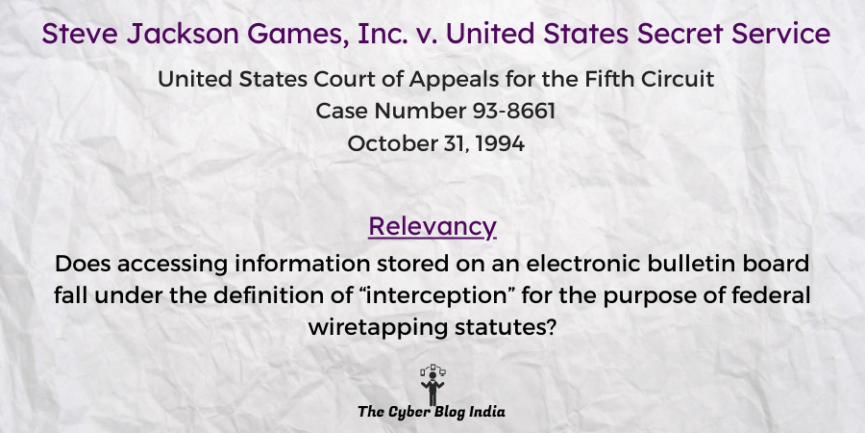Steve Jackson Games, Inc. v. United States Secret Service

Steve Jackson Games, Inc. v. United States Secret Service
36 F.3d 457
In the United States Court of Appeals for the Fifth Circuit
Case Number 93-8661
Before Circuit Judge Higginbotham, Circuit Judge Jones, and Circuit Judge Barksdale
Decided on October 31, 1994
Relevancy of the Case: Does accessing information stored on an electronic bulletin board fall under the definition of “interception” for the purpose of federal wiretapping statutes?
Statutes and Provisions Involved
- The Computer Fraud and Abuse Act, 18 U.S.C. § 1030
- The Electronic Communications Privacy Act, 18 U.S.C. §§ 2511-2520
Relevant Facts of the Case
- The appellant, Steve Jackson Games (SJG), operates an electronic bulletin board. While investigating for unauthorised duplication and distribution of a computerised text file, the Secret Service searched the locations for evidence of violations of Section 1030.
- SJG filed a suit against the agency, claiming violations under the Privacy Protection Act and the Federal Wiretap Act.
- The District Court held that the Secret Service violated the Privacy Protection Act and awarded the actual damages. However, the court held that the agency did not intercept, as required by the Federal Wiretap Act. The appellants have challenged this in the present case.
Prominent Arguments by the Counsels
- The appellant’s counsel argued that the information stored on an electronic bulletin board could still be intercepted under the Act, even though it was not in transit. The counsel argued that holding anything otherwise would not align with the Congress’ purpose in enacting the ECPA. ECPA provides protection for emails and bulletin boards.
Opinion of the Bench
- Congress intended to require law enforcement officers to satisfy more stringent requirements for an intercept to gain access to the contents of stored electronic communications. Moreover, accessing the data already stored does not fall under the definition of interception.
Final Decision
- The court affirmed the District Court’s decision.
Parul Anand, an undergraduate student at the National Law University, Jodhpur, prepared this case summary during her internship with The Cyber Blog India in May/June 2022.
